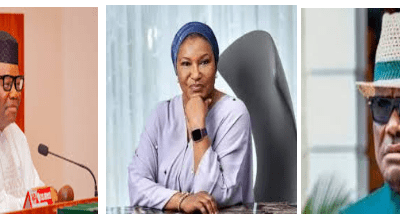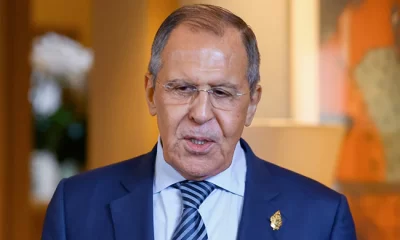Political Issues
A Psychological Guess Of A Failed Case By Obi and Atiku Against Tinubu, The Seating President – Salami Will Be Proved Right, I Hope I Am Wrong -By John Egbeazien Oshodi
The conclusion of this legal battle, whether in the lower courts or the Supreme Court, will be a defining moment. It will test the resilience of the judicial system and its capacity to dispel the psychological darkness that has gripped the nation. As the final chapters are written, the worry remains, but so does the enduring aspiration for a brighter and more just future.

In a society marred by deep-rooted corruption and where the tendrils of influence reach into every facet of governance, the impending legal battle takes on a gloomy hue. It unfolds in a nation where justice has at times been elusive, and the judiciary itself bears the weight of suspicion – a nation where fear, intimidation, and compromise often loom larger than the rule of law.
Justice Isa Ayo Salami’s past public remarks in 2015, cautioning against misplaced optimism, echo ominously. His words resonate with those who have witnessed the subtle and not-so-subtle forces that can sway the course of justice in a society riddled with corruption. It is a society where those who dare to speak the truth often find themselves in the crosshairs of power, where the judiciary itself may bear the scars of compromise and external pressures.
In this atmosphere of uncertainty, a psychological guess emerges, weighed down by the painful awareness of past injustices. It dares to envision a disheartening outcome for a case that carries the hopes of many. It fears that the very system designed to safeguard justice may falter under the weight of entrenched corruption, potentially wounding a man, Peter Obi, who has endeared himself to the people.
But in the midst of these fears and doubts, there is also a glimmer of hope – a hope that justice, fairness, and the rule of law will prevail, defying the odds and proving the naysayers wrong. It is a hope that the judiciary will rise above the shadows, guided by the principles of justice and the aspirations of a society yearning for change.
In the coming days, as the case unfolds and the judgment is delivered, the nation watches with bated breath, torn between the painful memories of the past and the fervent hope for a brighter future. In the end, the outcome will serve as a litmus test of the resilience of justice in a society deeply scarred by corruption. This psychological guess, heavy with foreboding, will either be confirmed or challenged by the verdict that emerges.
In the closing chapters of this legal saga, a shroud of psychological darkness descends, cloaking the hearts and minds of those who have watched with growing worry. As the case draws nearer to its conclusion, the weight of uncertainty bears heavily upon the collective consciousness.
This psychological darkness is born of the somber recognition that the journey thus far has been fraught with challenges, and the road ahead remains treacherous. It reflects the concerns that justice, fairness, and the rule of law may yet be obscured by the shadows of corruption and external pressures.
As the case heads towards its denouement, there is an unrelenting worry that transcends each passing day. It is a worry that transcends the lower courts, extending its reach even to the hallowed halls of the Supreme Court. The fear persists that the core principles of justice may not find their rightful place in the final judgment, leaving a society in perpetual disquiet.
The conclusion of this legal battle, whether in the lower courts or the Supreme Court, will be a defining moment. It will test the resilience of the judicial system and its capacity to dispel the psychological darkness that has gripped the nation. As the final chapters are written, the worry remains, but so does the enduring aspiration for a brighter and more just future.
I have a painful but resolute conclusion underscores a critical sentiment shared by many individuals in Africa, including Nigerians. It’s a recognition that despite the challenges posed by corruption, political elites, and hidden agendas, the perseverance and resilience of the people are essential.
As the court’s decision is awaited, it’s important to remain engaged in the democratic process and to respect the rule of law, regardless of the eventual judgment. Legal processes play a crucial role in upholding justice and maintaining the integrity of the political system.
Trust in the judiciary is crucial for a functioning democracy, and efforts to strengthen the rule of law and protect judicial independence are ongoing challenges in many countries.
The case of Bush v. Gore in the United States serves as a poignant reminder of the importance of timely resolution in election disputes. In 2000, the legal battle over the recount of votes in Florida was resolved within approximately 35 days, leading to a decisive ruling by the Supreme Court. This swift resolution played a significant role in maintaining public confidence in the electoral system.
While it is essential to acknowledge that comparing an advanced democracy like the United States to Nigeria may not be entirely fair, the concept of sensible time frames holds universal relevance. The extended duration of Peter Obi/Atiku’s legal challenge, spanning from March 21, 2023, to September 6, 2023, totaling approximately 169 days, raises valid concerns about the impact on public trust and confidence.
In any democracy, whether advanced or emerging, the timely resolution of election disputes is critical to mitigating suspicions and preserving the integrity of the electoral process. Complex legal proceedings may naturally take time, but prolonged disputes can exacerbate doubts, particularly in a society marked by deep-rooted corruption.
No matter how it all ends, there is a sense of both pain and hope. The pain stems from the fear that external pressures, corruption, or compromise within the judiciary may influence the outcome, potentially affecting a leader like Peter Obi, who enjoys widespread support.
As we await the court’s decision, one thing remains clear: The principles of democracy, including the rule of law, freedom of expression, and the right to peaceful protest, are essential tools for promoting positive change and ensuring that the voice of the people is heard. No matter how it all ends, I weep in pain and joy that we will get there one day. The question is when.
Professor John Egbeazien Oshodi, who was born in Uromi, Edo State, Nigeria, to a father who served in the Nigeria police for 37 years, is an American-based police and prison scientist and forensic, clinical, and legal psychologist. A government consultant on matters of forensic-clinical psychological services in the USA; and a former interim associate dean and assistant professor at Broward College, Florida. The Founder of the Dr. John Egbeazien Oshodi Foundation, Center for Psychological Health and Behavioral Change in African Settings. A former Secretary-General of the Nigeria Psychological Association. In 2011, he introduced state-of-the-art forensic psychology into Nigeria through N.U.C. and Nasarawa State University, where he served in the Department of Psychology as an Associate Professor. He has taught at various universities and colleges including Florida memorial University, Florida International University, Broward college, Lynn University, and a contributing faculty member at the Weldios university in Benin Republic, Nexus International University, Uganda, Nova Southeastern University and Walden University in USA. Professor Oshodi is highly regarded as an authority on psycho-prescriptive writings concerning African institutional and governance matters. With an impressive body of work that encompasses over forty academic publications and books, as well as over 300 public opinion articles, he emphasizes the values of truth, ethics, and transparency in his work.
Jos5930458@aol.com








